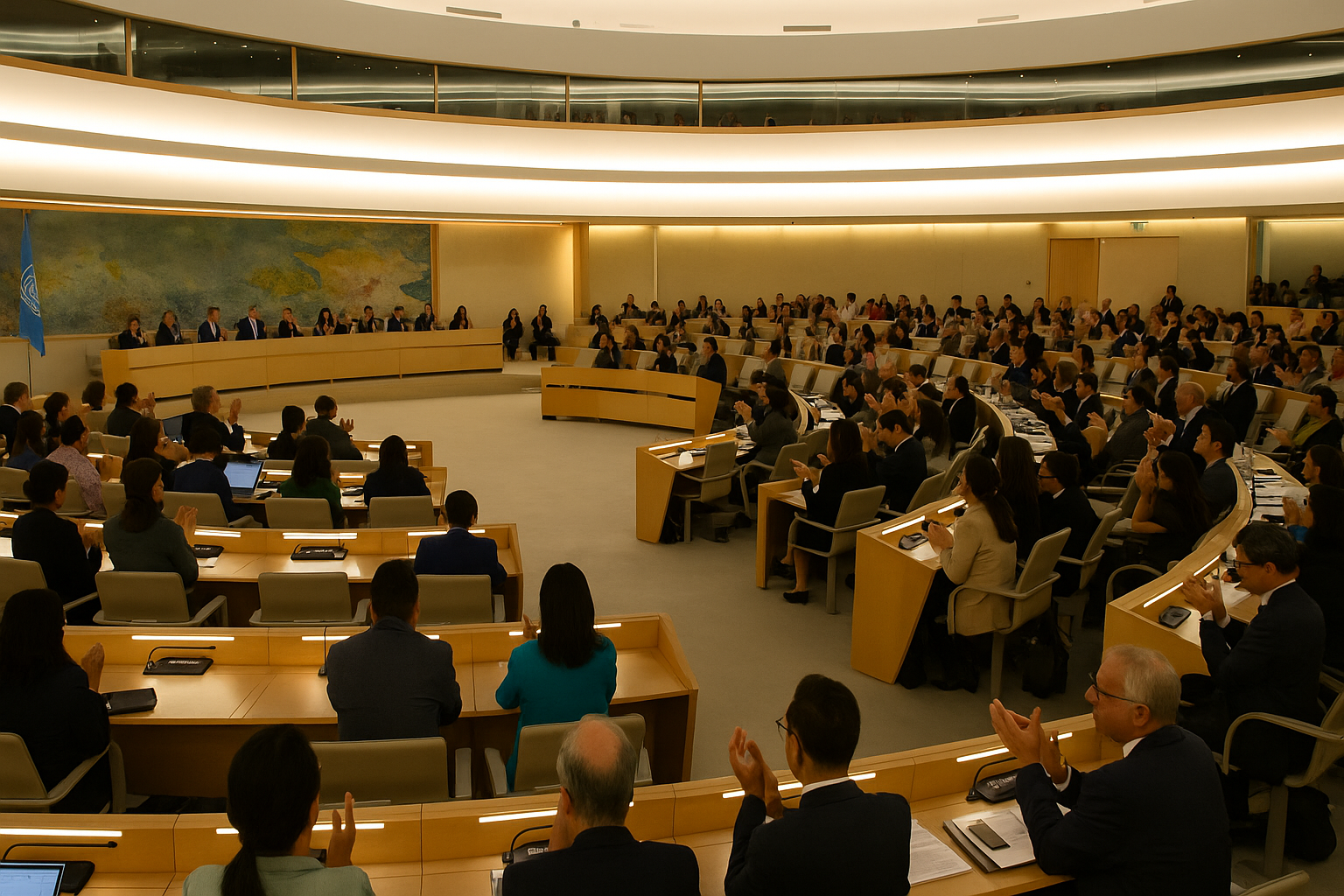In October 2022, the chamber of the UN Human Rights Council erupted in applause. The occasion was not a human rights breakthrough but the defeat—by a single vote—of a motion to merely debate the UN’s own findings that China may have committed crimes against humanity in Xinjiang. For Uyghur families waiting for justice, the applause was a cruel reminder that even the world’s highest human rights forum could be bent into celebrating impunity.
From that moment in Geneva to the passage of sweeping security laws in Hong Kong, Beijing’s playbook has remained consistent: deny, deflect, and obstruct. What began as defensive rhetoric has hardened into a systematic strategy of stonewalling, turning China from a reluctant participant in global governance into an architect of its paralysis.
Applause for Atrocities: The Xinjiang Watershed
The 2022 UN assessment of Xinjiang was unambiguous, warning that China’s mass detention, torture, and coercive birth control policies against Uyghurs “may constitute crimes against humanity.” Yet weeks later, a modest motion to debate those findings was defeated in the Council—19 votes against, 17 in favour, and 11 abstentions.
The symbolism was extraordinary: the UN’s premier human rights body refused even to discuss allegations of systematic atrocities. Amnesty International’s Agnes Callamard condemned the outcome as one that “protects the perpetrators of human rights violations rather than the victims.”
Beijing’s lobbying had been exhaustive. Delegations were pressured, petitions circulated, and economic leverage applied, particularly through the Belt and Road Initiative. The outcome marked only the second time in the Council’s history that such a motion had failed—proof that China had mastered the art of converting diplomatic relationships into shields against accountability.
Article 23: Steamrolling Dissent
The passage of Hong Kong’s Article 23 legislation in March 2024 showcased the same contempt for international opinion. Despite warnings from the UK, US, EU, and UN experts, Chinese and Hong Kong officials dismissed criticism as “smearing” and “interference in internal affairs.”
What especially alarmed observers was the law’s extraterritorial scope. Amnesty International warned it would “leave no one safe from being labelled a threat to national security.” Yet Beijing defended the overreach as fully consistent with international law, even accusing critics of opposing its “proportionate extraterritorial effect.” International concerns were not negotiated; instead, they were steamrolled.
The Sovereignty Shield: China’s Favourite Defence
Central to China’s obstruction is its manipulation of sovereignty discourse. From Xinjiang to Hong Kong to the South China Sea, Beijing frames criticism as an attack on sovereignty—while simultaneously infringing upon the sovereignty of others.
Foreign Minister Wang Yi’s rhetoric captures this double standard: pledging to “safeguard the international system with the United Nations at its core” while dismissing unfavourable rulings as “a political circus dressed up as a legal action.” This selective invocation of sovereignty appeals to states wary of Western dominance but allows Beijing to treat international law as optional.
India’s Transparency: A Stark Counterpoint
India’s conduct in UN peacekeeping operations provides a striking counterexample. With 49 missions and over 250,000 personnel deployed, India operates under international command structures and adheres to accountability mechanisms. New Delhi supports the UN’s UNITE Aware platform for real-time mission oversight and partners with the UN C4ISR Academy to build capacity.
External Affairs Minister S. Jaishankar has stressed that “maximum transparency should remain a principle” in peacekeeping technology. India pays a price for this openness: 174 Indian peacekeepers have lost their lives, the highest of any country. Yet New Delhi persists, in sharp contrast to Beijing’s refusal to allow even basic UN access to Xinjiang.
Unlike the PLA, which serves the Communist Party, India’s armed forces swear allegiance to the Constitution and remain subject to parliamentary oversight. The contrast is stark: one system rooted in democratic accountability, the other in party control.
Systematic Obstruction, Global Costs
Beijing’s stonewalling is not merely defensive; it is corrosive. The October 2022 vote proved that sufficient economic leverage can neuter even the UN’s human rights machinery. Since then, China has blocked NGO access, rejected UN recommendations, and normalised extraterritorial repression through Hong Kong’s laws.
The pattern is consistent: demand respect while rejecting norms, invoke sovereignty while eroding others’, and seek global leadership while hollowing out the very institutions that confer legitimacy. This selective compliance corrodes the international legal order and emboldens other authoritarian regimes to follow suit.
Power Without Trust
Stonewalling may grant Beijing tactical victories, but at a strategic cost. By blocking accountability in Xinjiang and dismissing global objections to Hong Kong, China undermines the very institutions that lent it legitimacy on the world stage.
The irony is unmistakable. Beijing demands recognition as a great power while dismantling the norms that define great power responsibility. Its victims—in Xinjiang, Hong Kong, and beyond—remain without justice. And the world is left facing a paradox: a China more powerful than ever, yet less trusted than at any point in its modern ascent.

